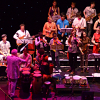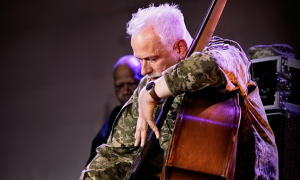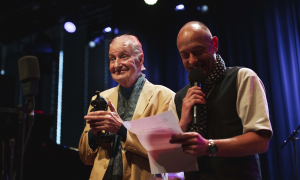Home » Jazz Articles » Profile » Tony Haynes Has Left Town... But What A Legacy He Leaves Behind
Tony Haynes Has Left Town... But What A Legacy He Leaves Behind

Tony Haynes
composer / conductor1941 - 2024

Grand Union Orchestra
band / ensemble / orchestraHaynes' politics were defined by anti-racism, internationalism and anti-militarism and infused the music he created throughout his career. His activism extended into community education and local, national and international politics. He was one of those rare individuals who succeed in integrating all aspects of their life, personality and beliefs into a unified whole. And that unification and integration was always expressed most clearly in the music he created.
Between 1975-9, Haynes led the tentet, jazz-rock group RedBrass featuring saxophonists
Pete Hurt
saxophone, tenor
Chris Biscoe
saxophoneb.1947

Dick Pearce
b.1951The orchestra grew out of the Grand Union Theatre troupe formed by Haynes, along with John Cumming (later of Serious productions) and others. The company's first show was Jelly Roll Soul, based on the life of

Jelly Roll Morton
piano1890 - 1941
This was really brought home to me recently in an academic piece I was working on. I referred to the piece "Notun Desh, Notun Jiban" from Now Comes The Dragon Hour (2002), describing it as "dialectic" in the Brechtian sense of "dialectical theatre." The extract lasts twenty minutes and divides into six sections featuring voices, Bengali rag-based folk melodies, sitar and tabla combining with a South American groove, big band jazz riffs, the exquisite voices of Lucy Rahman and " data-original-title="" title="">Akash Sultan and solos on flute and tenor sax from " data-original-title="" title="">Louise Elliott. For me, it summed up Haynes unusual skills and I wrote:
Haynes uses both the music and the words to pose questions, with the jazz instruments often acting almost as a Greek chorus embracing, commenting upon and extending what is happening elsewhere in the performance. In this context, the fusion element is not only musical but social as well. It is as if these musics connect as an echo of shared experience or as a gesture of support from one side of the world to another.
Performances were always epic and spectacular affairs with Indian, Chinese, Caribbean, African and South American instruments alongside the saxophones, trumpets, trombones, electric guitar, bass and drums. Percussion was always at the heart of the music but so too were the voices uniquely singing in Portuguese, Bengali, Chinese and English. Shows like Here Comes the Dragon's Hour, If Paradise (2005) and Undream'd Shores (2014) had an almost operatic quality featuring lyrics and poetry that told tales of struggle and survival. It was all fired by Haynes' strong sense of justice but was never preachy. The music always came first.
Song of Contagion from 2017 was one of the company's most ambitious projects. Available on DVD, the show explored the differential impacts of disease dependant on an individual or community's race, ethnicity, place of birth and, not least, class, raising questions about big Pharma, an industry disinterested in human need unless profit comes attached. It might sound didactic but it certainly was not. It was one of the most powerful and compelling of Grand Union's performances—and given the Covid pandemic that followed and the lessons yet to be learned from that, it was as timely as it was prophetic.
But then, dedication to education and to community and communal music-making was as important to the shows. Under Haynes' auspices, Grand Union developed and sustained a youth orchestra, the Re:Generation Band for graduates of the former, a community orchestra and a choir—all within the East End of London the orchestra served. Operations with much greater arts funding boast of less in their prospectuses. The slogan "Think globally, act locally" could have been coined with Haynes in mind.
Unforgotten Voyages, performed at the Hackney Empire in June 2023, was the company's last show. It commemorated the 75th anniversary of the arrival of the Empire Windrush at Tilbury Docks in 1948, bringing workers from the Caribbean to help rebuild Britain after the war. I interviewed Haynes for an article about the show. For jazz purists, Grand Union was perhaps never "jazz" enough," while the world music audience never seemed to cotton on to the orchestra's vibe. Haynes' success in building an audience that defied category was one of his many achievements. Lucid as always, as we talked, he summed up perfectly his and the orchestra's approach, while tying it to the wider jazz tradition.
Jazz is an attitude to music-making. It's an approach to music that can be replicated in lots of different forms. I feel we follow directly in the footsteps of

Jelly Roll Morton
piano1890 - 1941

Duke Ellington
piano1899 - 1974
By that point, the asbestos-related cancer had truly begun to take its toll on his, hitherto-astonishing, energy levels. He knew this was probably his last show. I visited him a few months before he left town, to use

Charles Lloyd
saxophoneb.1938
Tony Haynes is lovingly remembered by his wife Caroline, children Gabriel, Will and Lily, and grandchildren Jesse and Eve, by his dozens of colleagues and by the thousands upon thousands of lives he touched with his music. He was a rare talent and the music he created for Grand Union is a testament to that talent and to the person he was. Tony Haynes might have left town but what an amazing legacy!
Tags
Profile
Tony Haynes
Duncan Heining
United Kingdom
Grand Union Orchestra
Pete Hurt
Chris Biscoe
Dick Pearce
Butch Potter
Heather Jones
Josefina Cupido
Jelly Roll Morton
Lucy Rahman
Akash Sultan
Louise Elliott
Mingus
duke ellington
Comments
PREVIOUS / NEXT
Support All About Jazz
 All About Jazz has been a pillar of jazz since 1995, championing it as an art form and, more importantly, supporting the musicians who make it. Our enduring commitment has made "AAJ" one of the most culturally important websites of its kind, read by hundreds of thousands of fans, musicians and industry figures every month.
All About Jazz has been a pillar of jazz since 1995, championing it as an art form and, more importantly, supporting the musicians who make it. Our enduring commitment has made "AAJ" one of the most culturally important websites of its kind, read by hundreds of thousands of fans, musicians and industry figures every month.






 Buy Now
Buy Now























